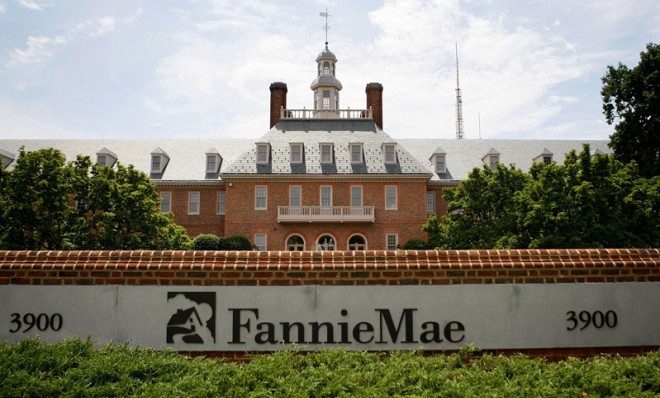Who gets Fannie's and Freddie's profits?
The government-sponsored mortgage giants' shareholders want their money back

A free daily email with the biggest news stories of the day – and the best features from TheWeek.com
You are now subscribed
Your newsletter sign-up was successful
Fannie Mae's and Freddie Mac's shareholders want their money back, said Gretchen Morgenson at The New York Times. Few investors would "buy stock in a company that barred you from sharing in its future earnings." After all, "participating in the upside is what stock ownership is all about." But shareholders in the two government-sponsored mortgage enterprises can't do so, thanks to a 2012 government restriction that bars investors from receiving Fannie's and Freddie's profits. Back then, stockholders "had little hope of making much money." But now Fannie and Freddie are booming, and instead of sharing the wealth, the government is "siphoning off the entities' profits." The hedge fund Perry Capital is leading investors in a federal lawsuit challenging the government's rule, claiming it amounts to a "backdoor nationalization of the companies" without providing any compensation for shareholders.
Fannie's and Freddie's stock prices rose by 950 percent last year, said Patrick Morris at The Motley Fool. Yet these companies "operate with a total disregard for common shareholders by returning all profits to the U.S. Treasury." And regardless of the court case, there's no reason to think that will change soon. Legislators on both sides of the aisle, along with President Obama and Freddie and Fannie officials, have made it clear that they're focused on benefiting taxpayers, not shareholders. Shareholders had better realize that for these housing giants, "the days of wild speculation and surging stock prices are over."
This arrangement is "truly outrageous," said David Skeel at The Wall Street Journal. The government "insists it was looking after taxpayers' interests" by swooping in to collect the profits, "but it hasn't explained why it cut private shareholders off when it began to look like they too might benefit." The government should roll back the 2012 rule on its own, but "more likely, the issue will be decided in the courts." If the plaintiffs win, at least "Fannie's and Freddie's shareholders will fare better than other investors (such as Chrysler's senior lenders) who have been blindsided by the government's growing penchant for picking winners and losers." In the end, though, courts can only do so much to "repair the rule of law. A far better approach would be for the government to honor it in the first place."
The Week
Escape your echo chamber. Get the facts behind the news, plus analysis from multiple perspectives.

Sign up for The Week's Free Newsletters
From our morning news briefing to a weekly Good News Newsletter, get the best of The Week delivered directly to your inbox.
From our morning news briefing to a weekly Good News Newsletter, get the best of The Week delivered directly to your inbox.
Hold on, said Paul McMorrow at The Boston Globe. Let's not forget that the greed of private investors is what led to the collapses of Fannie and Freddie — and thus to "the costliest bailout of the financial crisis." The two companies' "subprime bond binge had nothing to do with helping Americans buy homes and everything to do with chasing profits for private shareholders." And now we have Wall Street "trying to sink its hooks back into the mortgage companies." It's too bad Congress didn't have the nerve to solve this problem once and for all "by putting the companies down for good." As matters now stand, "if the current Wall Street gambit succeeds, it could re-establish the same dynamic that helped ruin the companies in the first place."
A free daily email with the biggest news stories of the day – and the best features from TheWeek.com
Sergio Hernandez is business editor of The Week's print edition. He has previously worked for The Daily, ProPublica, the Village Voice, and Gawker.
-
 The ‘ravenous’ demand for Cornish minerals
The ‘ravenous’ demand for Cornish mineralsUnder the Radar Growing need for critical minerals to power tech has intensified ‘appetite’ for lithium, which could be a ‘huge boon’ for local economy
-
 Why are election experts taking Trump’s midterm threats seriously?
Why are election experts taking Trump’s midterm threats seriously?IN THE SPOTLIGHT As the president muses about polling place deployments and a centralized electoral system aimed at one-party control, lawmakers are taking this administration at its word
-
 ‘Restaurateurs have become millionaires’
‘Restaurateurs have become millionaires’Instant Opinion Opinion, comment and editorials of the day